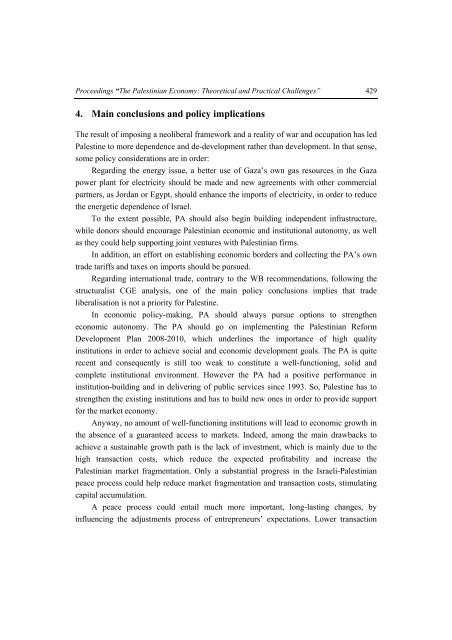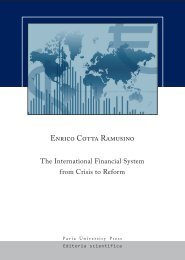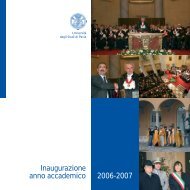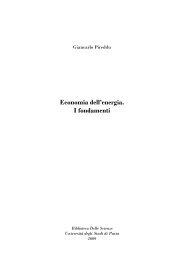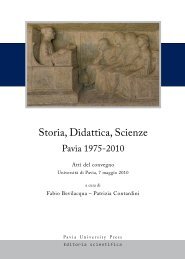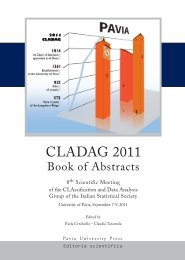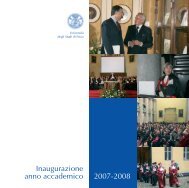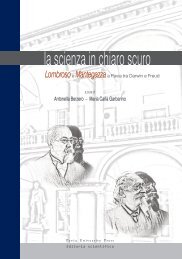The Palestinian Economy. Theoretical and Practical Challenges
The Palestinian Economy. Theoretical and Practical Challenges
The Palestinian Economy. Theoretical and Practical Challenges
You also want an ePaper? Increase the reach of your titles
YUMPU automatically turns print PDFs into web optimized ePapers that Google loves.
Proceedings “<strong>The</strong> <strong>Palestinian</strong> <strong>Economy</strong>: <strong>The</strong>oretical <strong>and</strong> <strong>Practical</strong> <strong>Challenges</strong>” 429<br />
4. Main conclusions <strong>and</strong> policy implications<br />
<strong>The</strong> result of imposing a neoliberal framework <strong>and</strong> a reality of war <strong>and</strong> occupation has led<br />
Palestine to more dependence <strong>and</strong> de-development rather than development. In that sense,<br />
some policy considerations are in order:<br />
Regarding the energy issue, a better use of Gaza’s own gas resources in the Gaza<br />
power plant for electricity should be made <strong>and</strong> new agreements with other commercial<br />
partners, as Jordan or Egypt, should enhance the imports of electricity, in order to reduce<br />
the energetic dependence of Israel.<br />
To the extent possible, PA should also begin building independent infrastructure,<br />
while donors should encourage <strong>Palestinian</strong> economic <strong>and</strong> institutional autonomy, as well<br />
as they could help supporting joint ventures with <strong>Palestinian</strong> firms.<br />
In addition, an effort on establishing economic borders <strong>and</strong> collecting the PA’s own<br />
trade tariffs <strong>and</strong> taxes on imports should be pursued.<br />
Regarding international trade, contrary to the WB recommendations, following the<br />
structuralist CGE analysis, one of the main policy conclusions implies that trade<br />
liberalisation is not a priority for Palestine.<br />
In economic policy-making, PA should always pursue options to strengthen<br />
economic autonomy. <strong>The</strong> PA should go on implementing the <strong>Palestinian</strong> Reform<br />
Development Plan 2008-2010, which underlines the importance of high quality<br />
institutions in order to achieve social <strong>and</strong> economic development goals. <strong>The</strong> PA is quite<br />
recent <strong>and</strong> consequently is still too weak to constitute a well-functioning, solid <strong>and</strong><br />
complete institutional environment. However the PA had a positive performance in<br />
institution-building <strong>and</strong> in delivering of public services since 1993. So, Palestine has to<br />
strengthen the existing institutions <strong>and</strong> has to build new ones in order to provide support<br />
for the market economy.<br />
Anyway, no amount of well-functioning institutions will lead to economic growth in<br />
the absence of a guaranteed access to markets. Indeed, among the main drawbacks to<br />
achieve a sustainable growth path is the lack of investment, which is mainly due to the<br />
high transaction costs, which reduce the expected profitability <strong>and</strong> increase the<br />
<strong>Palestinian</strong> market fragmentation. Only a substantial progress in the Israeli-<strong>Palestinian</strong><br />
peace process could help reduce market fragmentation <strong>and</strong> transaction costs, stimulating<br />
capital accumulation.<br />
A peace process could entail much more important, long-lasting changes, by<br />
influencing the adjustments process of entrepreneurs’ expectations. Lower transaction


